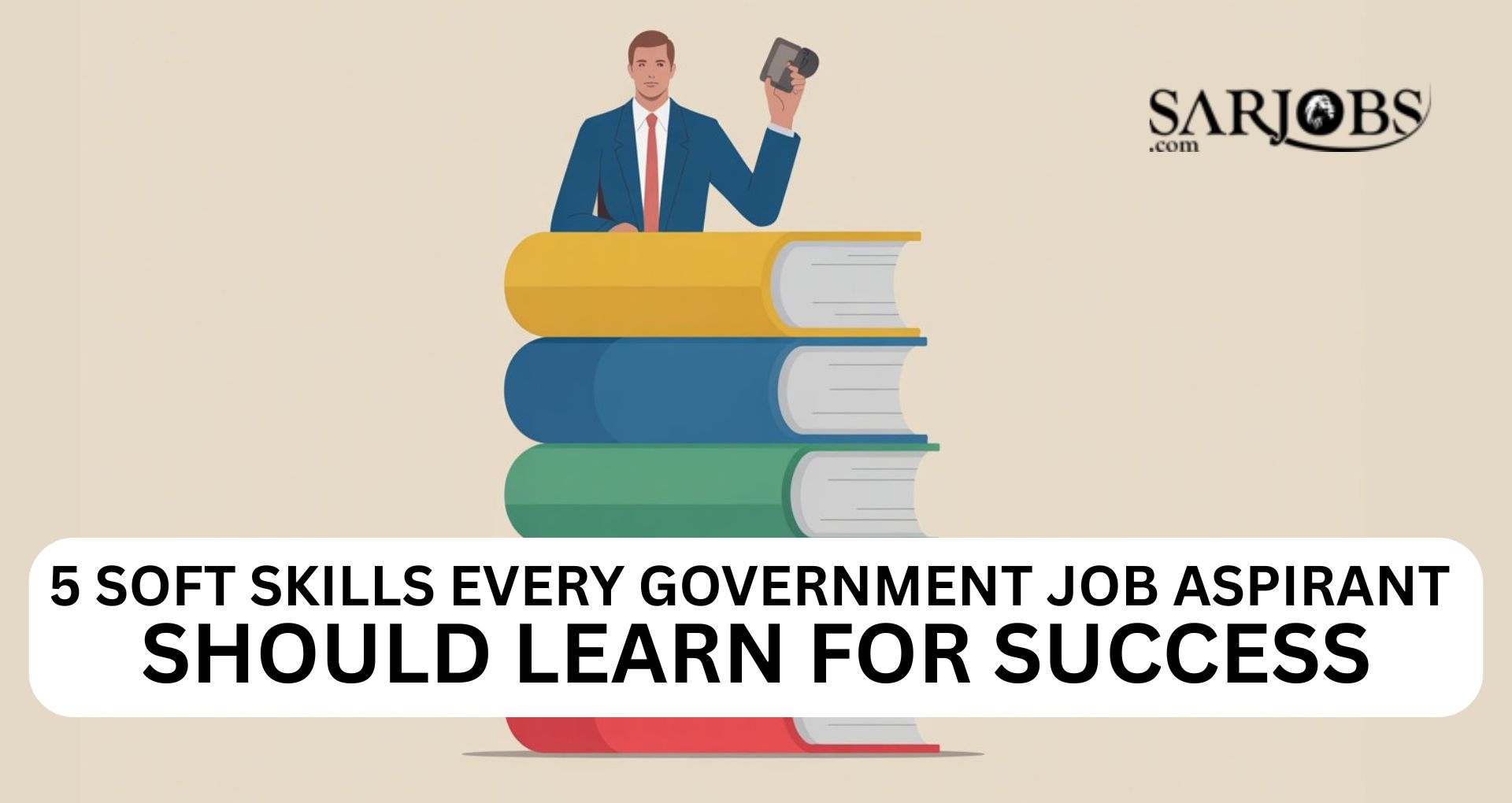Author: by Chandan Giri
Published Date & Category - July 11, 2025 || gyaan
5 Soft Skills Every Government Job Aspirant Should Learn
When we think of government jobs, we mostly think about exams, books, and current affairs. But once the exam is cleared, the real job begins. And it’s not just about knowing things—it’s also about how you behave, how you talk, how you deal with others. That’s where soft skills come in.These are the human qualities—how you speak, how you stay calm, how you work with people. Most people ignore them, but they matter a lot.Here are five soft skills every government job aspirant should work on. Doesn......

Chandan Giri
July 11, 2025
When we think of government jobs, we mostly think about exams, books, and current affairs. But once the exam is cleared, the real job begins. And it’s not just about knowing things—it’s also about how you behave, how you talk, how you deal with others. That’s where soft skills come in.
These are the human qualities—how you speak, how you stay calm, how you work with people. Most people ignore them, but they matter a lot.
Here are five soft skills every government job aspirant should work on. Doesn’t matter whether you’re going for UPSC, SSC, state PCS, banking, or anything else.
1. Communication Skills
You’ll deal with people every day. Whether it’s seniors, colleagues, or citizens, you have to talk clearly and respectfully. And not just talk—you’ll also have to write letters, file reports, maybe even speak in front of a group.
If your words are confusing, people won’t understand. If your tone is rude, they won’t listen.
Why it matters:
- Good communication is needed in interviews.
- You’ll be writing and explaining stuff once you join the job.
- Public roles demand clear, respectful speech.
What to do:
- Talk slowly and clearly. Don’t rush.
- Listen properly before you reply.
- Read something aloud daily—it helps.
- Try writing short notes or summaries of what you study. It improves your writing.
You don’t need to use fancy words. Just keep it simple and direct. That works best.
2. Time Management
There’s always too much to study and never enough time. That’s the first reason time matters. The second reason—you’ll still need it after the exam.
Government work runs on deadlines. If you delay something, the whole chain gets affected.
Why it matters:
- There’s a huge syllabus, and you have to finish it in limited time.
- Officers get tons of files, requests, and meetings.
- Work piles up easily if you don’t keep track.
What to do:
Make small daily goals, not huge plans.
- Don’t waste time on distractions—social media, overthinking, too many breaks.
- Start your day early if possible.
- Stick to a rough timetable. It doesn’t have to be perfect, just consistent.
Most toppers don’t study for 15 hours. They just use their 6–8 hours well. That’s all.
3. Emotional Stability
Exams are tough. You study for months, maybe years. Sometimes you pass. Sometimes you don’t. It messes with your head.
Even after selection, the job is not smooth. There’s pressure, delay, criticism, and sometimes frustration. You need to stay steady in your mind.
Why it matters:
- Interviews test your emotional strength.
- The actual job has stress—complaints, crisis, sudden changes.
- If you can’t control anger, fear, or panic, your decisions will suffer.
What to do:
- Don’t compare your journey with others. Everyone’s timing is different.
- If a day goes bad, take a break. Then start again.
- Breathe. Meditate. Go for a short walk. Anything that relaxes your nerves.
- Learn to pause before reacting. That short pause helps a lot.
Nobody’s asking you to be perfect. Just try to be calm more often than not.
4. Team Behavior
Even if you're top rank, you’ll still be working with a team. There will be seniors, juniors, support staff, and people from all walks of life. You’ll need to adjust, listen, and work together.
Why it matters:
- Fieldwork is never a solo job.
- You’ll need support from others to get things done.
- Your ability to adjust and share credit shows real maturity.
What to do:
- Be polite. Always. Even if others aren’t.
- If someone points out a mistake, listen without getting defensive.
- If you’re in a group study or training session, don’t dominate. Let everyone speak.
- Appreciate others when they do something well. A small thank you or nod goes a long way.
Offices work better when people pull each other up, not down.
5. Problem Solving
You can memorize facts. But real work doesn’t come with answer keys. You’ll need to think on your feet, deal with real problems, and take decisions with limited info.
Problem-solving is about not freezing when things go wrong.
Why it matters:
- Government jobs involve fixing things—not just following orders.
- You’ll be expected to give solutions, not excuses.
- Boards look for this skill during interviews—how do you think through a messy situation?
What to do:
- Don’t just study facts. Ask why things happen, and how they can be improved.
- Read case studies of officers or real incidents.
- Discuss daily issues—like traffic, water, health—with friends. Talk about solutions.
- Solve puzzles and logic games occasionally. It sharpens thinking.
Learning this doesn’t mean being perfect. It just means not panicking when something unexpected comes up.
How These Skills Help in Interviews
People often say interviews are about “confidence” or “presence.” But what they really mean is your soft skills.
- Do you answer clearly?
- Do you listen and pause?
- Do you sound balanced?
- Do you look like someone who will work well with others?
These are things the board looks for. Books can’t teach them, but practice can.
If you’ve ever wondered why someone with average marks got selected while a topper didn’t—it’s usually this. They knew how to behave, not just answer.
How You Can Start Building These Skills
You don’t need to join a class for this. Just try these small things:
- Speak in front of a mirror for 5 minutes a day.
- Write 100 words daily in your own words about something you saw or felt.
- If you're stuck, don't scroll—take a walk or sit quietly for 10 minutes.
- Observe how your teacher or a good speaker talks. Copy their pauses and tone.
- Read out loud from a newspaper—pick one story a day.
- Record your mock interview answers, listen, and adjust.
These habits take 15–20 minutes daily. But over months, they make a huge difference.
If you’re serious about a government job, don’t focus only on books. Think about the job, the people you’ll work with, and the kind of person you want to be. These 5 soft skills won’t give you direct marks. But they’ll help you in ways that books can’t. Most importantly, they’ll stay with you—before, during, and after the job. Take time to build them. You’ll thank yourself later.
Frequently Asked Questions
1. What are soft skills and why are they important for government job aspirants?
Soft skills are personal attributes like communication, teamwork, and emotional control. They help aspirants perform better in interviews and succeed in government roles.
2. How can I improve my communication skills for government job interviews?
Practice speaking clearly and politely, listen carefully, and work on writing simple and correct sentences. Reading newspapers aloud daily can also help.
3. Why is time management important during exam preparation?
Time management helps you cover the syllabus effectively, reduces stress, and ensures consistent study habits, which are essential for success in competitive exams.
4. How can emotional control benefit a government job aspirant?
It helps you stay calm during stressful exams and job interviews, make better decisions, and handle workplace pressure with maturity.
5. What role does teamwork play in government jobs?
Government work often requires collaboration with colleagues from various departments. Good teamwork ensures smooth task completion and better work relationships.
6. How can I develop problem-solving skills for government jobs?
Try to understand the logic behind issues, discuss current affairs, read case studies of officers, and practice thinking through real-life situations.
7. Can soft skills affect my government job interview results?
Yes. Interviewers assess your communication, confidence, emotional stability, and ability to work with others, which are all soft skills.
8. Are soft skills more important than technical knowledge?
Both are important. Technical knowledge helps clear exams, but soft skills help you perform well in interviews and succeed in the job.
9. How long does it take to improve soft skills?
Improvement depends on consistent effort. Small daily habits over weeks or months can lead to noticeable changes in communication and behavior.
10. Can soft skills be learned without formal training?
Yes. Soft skills can be improved through daily practice, observation, self-awareness, and simple exercises like reading aloud and participating in discussions.

Chandan Giri is a staff writer at Sarjobs.in who closely follows updates related to government job openings across India. He puts a strong focus on accuracy and timing, sharing useful details about vacancies, exam notices, admit cards, and result dates. Chandan has a solid grasp of recruitment rules and eligibility requirements, which helps readers get the right information without confusion. His writing style is straightforward and clear, making complex updates easier to understand. With a consistent effort to maintain quality, Chandan’s work supports job seekers who are preparing for exams and looking to build a stable career in the public sector. View more...


